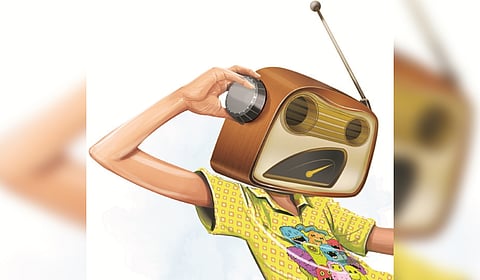

THIRUVANANTHAPURAM: ‘Schoolinte shabdam naadinte shabdam’ (The voice of the school is the voice of society). This is the slogan of Radio Mancha, an initiative by the students of Mancha Government VHSS in Nedumangad.
It was during the pandemic, when schools were closed and students were learning from home, that the concept of a radio for the students, by the students was mooted. Though government programmes like Victers were providing televised lessons at the time, the need for a more engaging and interactive learning platform was felt.
Pursuing the thought, Mancha school teachers and students started a podcast. It grew, transforming into a full-fledged community radio, and ended up drawing the attention of students from across Thiruvananthapuram as well as society. Now, other institutions have taken inspiration from the experiment, and are either adopting programmes of Radio Mancha or launching similar radio projects in their schools.
The first episodes for Radio Mancha were recorded when students couldn’t even meet in person. With nothing but curiosity and a willingness to learn, the students, backed by the school authorities, ventured into creating audio content.
Its initial programmes featured local luminaries like Kavalam Sreekumar, cinematographer Venu and space scientist N P Giri. The radio continued with programmes like the narration of Mahatma Gandhi’s story by S Gopalakrishnan. Soon, the team behind Radio Mancha began producing audiobooks, with a special edition on B R Ambedkar’s life released by actor Mammootty.
Radio Mancha became a tool for learning, reflection, and conversation. Textbooks from as early as 1956 were selected as subjects of discussion, connecting past with the present. The broadcasts covered everything from historical events to the social movements that shaped Kerala’s history. One standout programme was created for Vaikom Muhammad Basheer Day and, more recently, for the centenary celebration of the Vaikom Satyagraha.
The audiobook ‘Aa Kutti Gandhiye Thottu’ was released as a tribute to Vaikom Satyagraha, on Teacher’s Day by General Education Minister V Sivankutty through his Facebook page. It is based on a poem titled ‘Gandhithodal Mala’ by Anvar Ali, which itself was inspired by the moment when the student Vaikom Muhammad Basheer touched Gandhi during the Satyagraha.
Tamil-Malayalam writer Jayamohan, along with writers V M Girija, K C Narayanan, P P Ramachandran, K K Krishnakumar, Rafeeq Ahmed, Jyothibai Pariyadath, N G Nayanthara, Ajay P Mangattu, Shihabuddin Poythumkadavu, Kalpatta Narayanan, and B Balachandran, have contributed to the audiobook. S Uma, a student of Cotton Hill Girls’ School, also participated.
Student Ivana Vesly recites the poem ‘Gandhithodal Mala’ for the audiobook, which includes an introduction by headmistress K S Rashmi and a discussion about the poem. It marks the first time in Kerala that a school has released an audiobook based on a single poem. “At a time when history is often tampered with and textbooks are revised, initiatives like these offer hope. I wrote ‘Gandhithodal Mala’ as a song-poem. When students and teachers took it up for Radio Mancha, the piece gained a whole new contextual importance,” said poet Anvar Ali.
Through its special broadcasts, Radio Mancha talks about contemporary and curriculum-related topics. It has become a platform for students to discuss social issues, share their thoughts creatively, thereby becoming the voice of society.